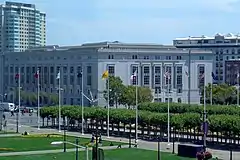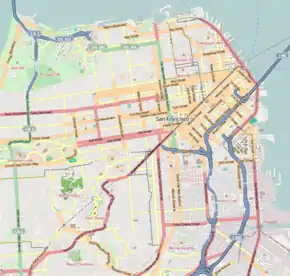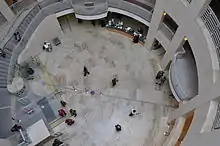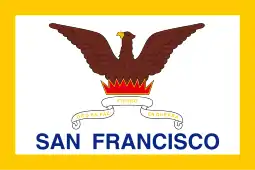Main Library (San Francisco)
The Main Library is the primary library of the San Francisco Public Library, located in San Francisco's Civic Center.
| San Francisco Main Library | |
|---|---|
 The library's exterior in 2008 | |
 San Francisco Main Library Location within San Francisco | |
| General information | |
| Type | Public Library |
| Architectural style | Beaux-Arts Revival[1][2] |
| Location | 100 Larkin St, San Francisco, California 94102 |
| Coordinates | 37°46′45″N 122°25′05″W |
| Construction started | 1993 |
| Completed | 1995 |
| Opening | April 18, 1996 |
| Cost | $109.5 million |
| Owner | San Francisco Public Library |
| Technical details | |
| Floor count | 7 |
| Floor area | 376,000 sq ft (34,900 m2) |
| Design and construction | |
| Architect | Pei Cobb Freed & Partners and Simon Martin-Vegue Winkelstein Moris[2] |
| Developer | San Francisco Public Library |

History
In 1986, a task force was set up to complete the design of the Civic Center, including the use of Marshall Square, next to the main library at the time, for a new main library.[3] Construction on the current Main Library began on March 15, 1993, financed by a US$109.5 million bond measure.[4] The building was completed in 1995 and opened a year later on April 18, 1996. The old main library, which was damaged in the 1989 Loma Prieta earthquake, was rebuilt as the new Asian Art Museum.
At over 376,000 square feet (34,900 m2) and with six floors above ground and one below, the new library is more than twice as big as the building it replaced. The new library includes over 300 computer terminals, room for 1100 laptops, and a new wing for children. The city spent $104.5 million on the new library.[4] Library visits doubled in its first year open, from 1.1 million to 2.1 million, and the number of library card holders nearly tripled.[5]
In October 1996 author Nicholson Baker wrote a critical article in The New Yorker about the weeding of books from the library as it moved to the new building. He was also critical about the elimination of the card catalog when the computerized catalog was introduced.[6] Due to this negative publicity, the library released an official response to Nicholson's New Yorker article, criticizing his claims.[5] There has also been criticism in the local press that the atrium significantly and deliberately reduced the amount of floor space available for shelving the library's collection which resulted in the destruction of over 200,000 books which were then buried in a landfill, gutting the research collections of one of the most important research facilities on the West Coast,[7][8] all of which occurred away from public sight or review. Later, under intense pressure that included then Mayor Willie Brown, City Librarian Ken Dowlin whose policy it was to weed and subsequently destroy the books, was forced to resign in January 1997.[8]
The library was prominently used in the 1998 film City of Angels.[9]
References
- "Architecture of the Main Library". San Francisco Public Library. Retrieved October 14, 2018.
- "Warm interior caught in a cold facade". San Francisco Examiner. April 15, 1996. Retrieved October 13, 2018.
- 125th Anniversary Timeline History Archived 2006-03-01 at the Wayback Machine of the San Francisco Public Library
- "Other Facts about the Building". San Francisco Public Library. Retrieved 2019-03-15.
- "San Francisco Public Library challenges accuracy of The New Yorker's "Author vs. the Library"". 1996-10-11. Archived from the original on 1998-12-03. Retrieved 2006-12-10.
- Baker, Nicholson (1996-10-14). "Letter from San Francisco: The Author vs. The Library". The New Yorker. Retrieved 2008-12-25.
- Wildermuth, John (2000-01-05). "Cost of Redoing S.F. Main Library Put at $28 million/Report notes lacks of shelf space". The San Francisco Chronicle. Retrieved 2006-12-10.
- "Dumped Books: The Indiscriminate Mass Weeding of the San Francisco Public Library". Retrieved 27 February 2014.
- "Filming locations for City of Angels (1998)".
External links
 Media related to San Francisco Public Library - Main Branch at Wikimedia Commons
Media related to San Francisco Public Library - Main Branch at Wikimedia Commons- "Main Library". San Francisco Public Library.
